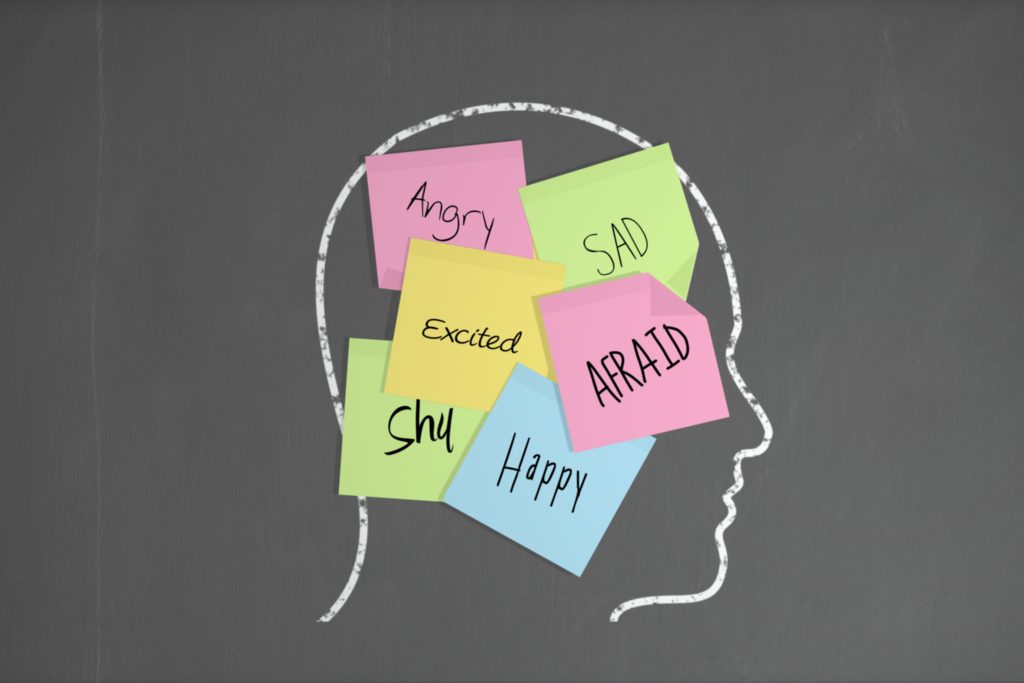
emotion post it notes
by Don Laird, Psychotherapist and Contributor
It’s that time of the year again. And yet, something isn’t right. Despite our best intentions, cautious optimism, and hopeful platitudes, the beginning of the 2021 school year is overshadowed by the specter of Covid-19 and its polarizing effects.
Ask any parent, child, or teacher, heading back to the classroom is not without its challenges in a normal year. However, the previous 19 months have been anything but normal. And now, children are expected to navigate a rather demanding path through the current stages of our ongoing pandemic. For those 12 years of age or older, the vaccine is readily available. The wait continues for our youngest and most vulnerable population.
Here are just a few things we as adults should be aware of moving into this school year. Keep in mind that every child is different, every family is different, but what follows may help even before the first bell rings.
Anxiety is growing among school-aged children and adolescents. It has been for years. Now let’s add a global health crisis to the mix and you can understand how especially unrealistic self-expectations and fear of the world at large can rattle even the most balanced child or family. So, returning to school this year can be an enormously challenging task for any child. Let alone one who already struggles with anxiety or worry.
Let’s look at it through a practical lens. Children are away from home and routine, and the rules have changed. In any given year the school environment requires certain demands that the summer setting does not. Summer rarely needs a child to sit still, stay organized, remain focused and on task and adapt to an extremely structured schedule.
Here are five things you should keep in mind before the first homeroom bell rings:
- Anxious Parents, Anxious Kids.
Modeling confidence and calm behaviors are central to most parenting situations, particularly when preparing a child ready for school. By fostering structure and daily routine in family life (bedtime, homework, limiting social media and news exposure), parents will find this transition period to be much smoother. Giving your kids too many choices about routine can backfire and ultimately put them in the seat of control. Remember, you are the parent.
Anxiety issues and traits can run in families. Children with anxious parents run a greater risk of experiencing anxiety themselves. It is still debatable as to whether it is genetics, environment, both, or something else, but there is no smoking gun when it comes to the root sources for anxiety. Yet, it is observable that children – and most adults – can be like energy sponges, absorbing energy and assimilating behaviors. Remember, a child is usually no calmer than his or her least-relaxed parent. Anxiety can impact someone’s ability to focus, stay on task and is generally categorized by a state of unrealistic and persistent worry. Again, add Covid-19 into the mix and it is easy to understand how baseline anxiety can escalate quickly.
Sometimes it can be difficult to vet between what is age-appropriate behaviors and anxiety, but if you have concerns you should first discuss these with your child’s teacher and then a mental health professional should the behaviors continue to escalate.
- Teachers Can Be Your Best Ally.
Teachers get to know how a child behaves without family being present. Thus, parents can gain information about learning difficulties and peer problems and friendships. Teachers are your closest allies when it comes to your child’s success in school, and you should talk to them regularly. You will learn more about how your child is navigating his or her world, both academically and socially, by talking with the teacher.
- Routines Are Crucial.
Above all, be positive and encouraging. Examples of some good routines might include creating an uncluttered workspace in the home; organizing a backpack, reviewing assignments; and discussing homework. You can observe your child’s strengths and weaknesses this way while also establishing and fostering good study habits. Also, be sure that your child is staying hydrated with lots of water and has the recommended amount of sleep for their age group.
- Don’t Worry.
Kids grow, learn, and develop at different rates. A delay in one area of development doesn’t necessarily mean your child has a disorder. There needs to be significant evidence and some testing to reach any firm conclusion. However, if you suspect there might be a problem with your child’s development, talk to their teacher and consult with a mental health professional.
- Leave Them Alone.
This may sound counterproductive or even counter intuitive, but a child needs downtime. A schedule that is bursting at the seams, with little or no room for relaxation is also ripe for an anxious or depressed child. Give them time. Don’t inundate them with statistics about your school district’s response to Covid or policies that are better left for adults to discuss. Life is short, sometimes hard. Don’t unpack your stuff on that person who happens to be your child. Give them breathing room and let them find out that the world can be a secure and inviting place without regimented schedules.
- Let Them Ask Tough Questions
And don’t be afraid to say that you don’t know the answer. Ask and value their thoughts on a subject. Giving children time and space to think for themselves will help them develop critical thinking and will allow them to go into the world with confidence and conviction.
***
 Don Laird, NCC, LPC, DCC, is a Licensed Professional Counselor with 20 years of experience providing psychotherapy and counseling to adults, teens and couples who are struggling with a wide range of mental health and life issues. Don is a writer and adjunct professor who teaches graduate and undergraduate courses in professional counseling and psychology at Carlow University. Additionally, he facilitates workshops and classes in dreams, creativity, self growth, and stress reduction.
Don Laird, NCC, LPC, DCC, is a Licensed Professional Counselor with 20 years of experience providing psychotherapy and counseling to adults, teens and couples who are struggling with a wide range of mental health and life issues. Don is a writer and adjunct professor who teaches graduate and undergraduate courses in professional counseling and psychology at Carlow University. Additionally, he facilitates workshops and classes in dreams, creativity, self growth, and stress reduction.

